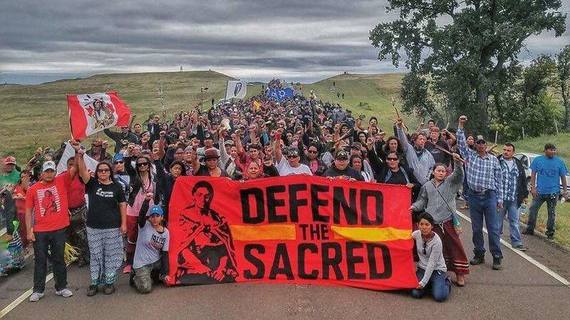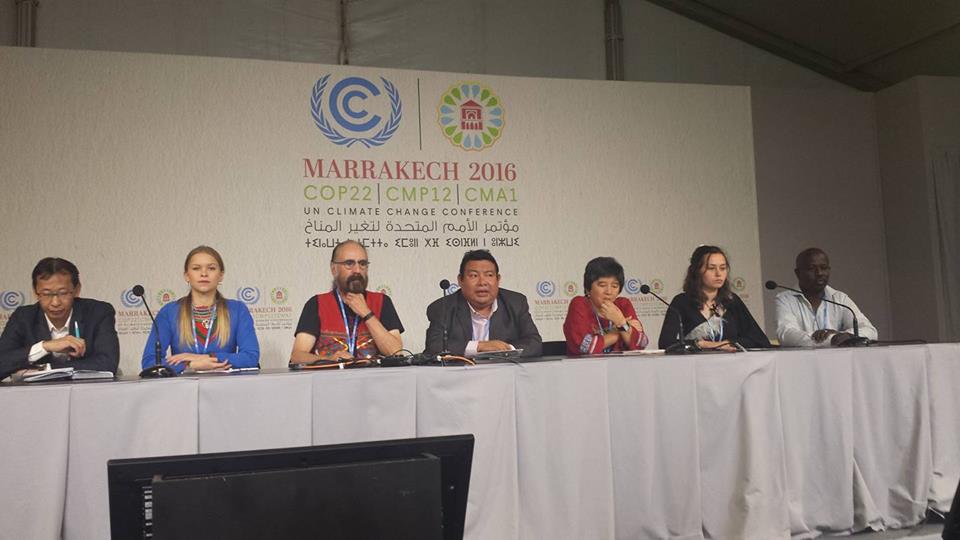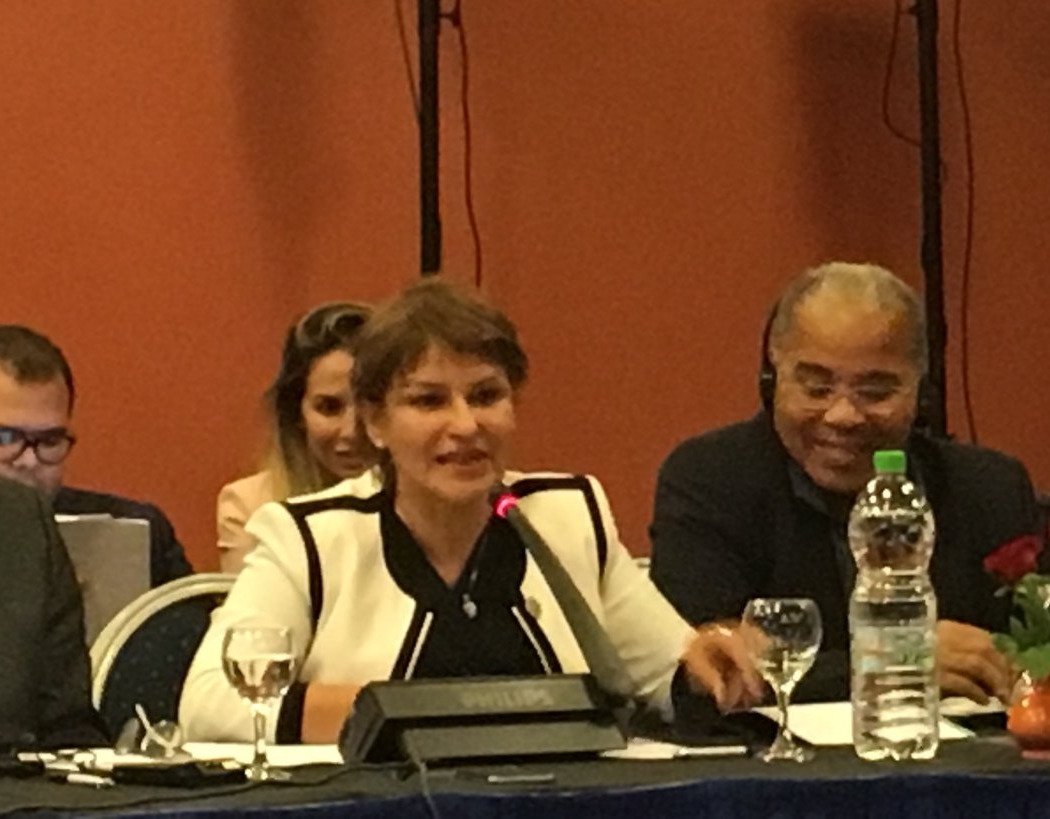Daily meetings for the Indigenous Peoples Caucus will be held from 9:00-10:00 at the World Conference Center in Bonn. On April 30th, the meeting will be Room BANGKOK. From May 1st-10th, the meetings will be held in the AH Upper Conference Room.
Indigenous Peoples discuss new platform at UNFCCC
At COP22 the Indigenous Peoples Caucus was invited by the UNFCCC secretariat to discuss a new platform for Indigenous Peoples as tangible a follow-up to the Paris Agreement and its paragraph 135. Representatives from 7 geo-political regions met to discuss the relevant article; provide comments on structure; and identify gaps as well as best practices. The Indigenous Peoples Caucus will submit its proposals to the UNFCCC secretariat on Friday, 11 November 2016.
Members of the Indigenous Peoples Caucus at the brainstorming session with the UNFCCC Secretariat.
Indigenous Peoples' Pavilion at COP 22 Opens
The “Indigenous Peoples’ & Communities’ Pavilion: Traditional Knowledge for Climate Action” (Pavilion) at the 22nd Conference of the Parties (COP 22) to the UN Framework Convention on Climate Change (UNFCCC) officially opened on 8 November 2016. The Pavilion will remain open to the public from 8-18 November 2016 and is located within the 'Civil Society Space’ or "Green Zone", which is adjacent to the COP 22 Blue Zone negotiation space. This Pavilion is accessible through accreditation.
The purpose of the Pavilion is to facilitate the effective representation of Indigenous Peoples and local communities by providing a dedicated gathering space to meet to coordinate on messaging and advocacy strategies; to convene events like presentations, policy dialogues, panel discussions, publication launches, etc. to advance discourse on indigenous peoples’ and communities’ solutions to climate change; and to be a center for learning and knowledge exchange on indigenous peoples’ and community issues in the climate context. The Pavilion will be a highly-visible platform for communicating and amplifying messages of Indigenous Peoples and local communities during the COP 22 negotiations.
African Indigenous Peoples Caucus meets at the Pavilion (Photo: Johnson Cerda)
Summary of all events at #Day3 #COP22 #IPs Pavilion:
11.15 - 11.45am
Forests of Peace in the Vaupés Department as a Conservation and Environmental Sustainability Strategy of the Amazon Region through the Strengthening and Wellness of the Indigenous Communities in the Postconflict - AATICAM (Vaupés-Colombia)
12 - 3pm
Climate Change and Indigenous Peoples: the Russian Case
Center for Support of Indigenous Peoples of the North (CSIPN) in a partnership with Russian-German Office of Environmental Information - German-Russian Exchange, IWGIA
3.15 - 5.15pm
Experiences of Non-Timber Resources in Protected Areas by the Indigenous People and Forest Communities
Alianza Mesoamericana de Pueblos y Bosques (AMPB) - MASTA
ACOFOP Guatemala - ACRE Brazil
Panel: Model of Good Gerritorial Governance for the Correct Performance of the Global Tropical Forests and the Study ‘Increasing the Profits of REDD+ for the Indigenous People and Traditional Communities’
AMPB,RED MOCAF, RIBCA, ACOFOP, ANFG, FEPROAH
5.30 - 6.30pm
Introduction of the Global Campaign for the Territorial Rights of the Indigenous People
Congreso General Guna / Red Indígena Bribi y Cabecar
6.45 - 7.15pm
Contribution of Indigenous Community’s Traditional Knowledge to the Valorization and Domestication of Native Species of Prior Importance in Sustainable Natural Ecosystem Conservation in View of Climate Action
Action Ceinture Verte pour l'Environnement, ACVE
Rodion Sulyandziga speaking at the Indigenous Peoples Pavilion at COP22 during the "Indigenous Peoples and Climate Change: Russia case" event.
Media Advisory: Indigenous Peoples Caucus stands in Solidarity with Standing Rock Sioux Tribe
Credits: Sacred Stone Camp Facebook Page
"We call upon all member states, to condemn the destruction of our sacred places and to support our nation’s efforts to ensure that our sovereign rights are respected. We ask that you call upon all parties to stop the construction of the Dakota Access pipeline and to protect the environment, our nation’s future, our culture and our way of life."
- Standing Rock Sioux Tribe Chairman Dave Archambault II
WHERE: Indigenous Peoples Pavilion : Green Zone, COP22, Marrakech, Morocco
WHEN: Nov 10th 1:45-2:15pm
WHAT: In the shadow of a Trump presidency the Indigenous Peoples Caucus at COP22 condemns the construction of the Dakota Access pipeline and stands in solidarity with our sisters and brothers of the Standing Rock Sioux Tribe and all “water protectors” in opposition to this project.
The Dakota Access pipeline is being built on the un-ceded treaty lands of the Standing Rock Sioux Tribe, without their free, prior and informed consent, as is described in the UN Declaration on the Rights of Indigenous Peoples article 32. The pipeline is also being constructed through sacred areas and ancestral burial grounds of the Standing Rock Sioux and other Indigenous Peoples of the area.
This massive construction project does not respect the Standing Rock Sioux's Treaty rights, sovereignty or their right to self-determination, and is an outright violation of their rights over their lands and resources as Indigenous Peoples, furthermore not respecting the human rights of Indigenous Peoples.
Speakers will present an overview of the situation at Standing Rock; share the full IP Caucus statement; and provide additional commentary; and take questions.
Moderator: Teanau Tuiono, Aotearoa
Roberto Mukaro Borrero, International Indian Treaty Council;
Alberto Saldamando, Indigenous Environmental Network
Jannie Staffansson, Sami Council
First Indigenous Peoples Press Conference at COP22
The Indigenous Peoples Caucus presented their views before the press on Tuesday 8 November 2016. Each region actively participated in presenting the perspectives of the Global Indigenous Peoples Caucus, as well as their own climate-related realities. In photo from left Rodion Sulyandziga (Russia); Jannie Staffansson (Norway); Alberto Saldamando (U.S.A); Estebancio Castro (Panama); Joan Carling (Philippines); India Logan Riley (Aotearoa/New Zealand); and Kimaren Stanley (Africa).
““As COP 22 is the COP for Action for the implementation of the Paris Agreement, Indigenous Peoples are calling on states and others to build partnerships with indigenous peoples based on the respect, recognition and protection of our rights, particularly to land and resource tenure in order to enhance the contributions of indigenous peoples to climate change mitigation and adaptation. Further, Indigenous peoples call on the states parties to support the Geneva Pledge on Human Rights and climate change to establish a working group or a programme of action on the implementation of the Paris Agreement. This shall include the full and effective participation of indigenous peoples through the appointment of representatives of indigenous peoples”
”
Indigenous Peoples Caucus Meets on Day 2
More Indigenous Peoples arrived today to the Blue Zone negotiations area, introducing themselves and integrating into the work to raise the visibility of Indigenous Peoples in this action-oriented COP. Specific proposals to be presented within the various meetings are being developed and the regional groupings are now moving forward with strategic planning.
Indigenous Peoples Caucus Statement at COP22 APA Session
Jannie Staffansson reads the Indigenous Peoples Caucus statement at the APA session of COP22 in Marrakech, Morocco, November 7, 2016
On Monday, Jannie Staffansson (Sami) delivered the Indigenous Peoples Caucus Statement at the #UNFCCC Ad Hoc Working Group on the Paris Agreement (APA) opening Plenary. The statement raised recommendations for the future implementation of the Paris Agreement, as well as called upon the countries who signed onto the Geneva Pledge on Human Rights and Climate Change to establish a Working Group or a program on Human Rights and Climate Change within the UNFCCC process. The statement made at the APA session was one of four presented by the Indigenous Peoples Caucus on Monday at COP22 in Marrakech, Morocco. #IIPFCC #Saamicouncil #IndigenousCOP22
Statement of the International Indigenous Peoples Forum on Climate Change (IIPFCC) to the Ad Hoc Working Group for the Paris Agreement (APA), November 7, 2016, Marrakech, Morocco
Indigenous Peoples Caucus begins daily meetings at COP22
The first of two weeks of daily meetings for the Indigenous Peoples Caucus was held on Monday, 7 November 2016 from 9-10am at the COP22 conference site in Marrakech, Morocco. During the meeting, strategies were set for the engagement of Indigenous Peoples from seven geo-political regions at COP22 throughout the day and for the week. On Monday, the #IIPFCC delivered four statements, two were read in plenary sessions and two were submitted to the UNFCCC Secretariat. All the statements from the Indigenous Peoples Caucus are now located at the UNFCC website and will be made available here shortly. It is noteworthy that following very positive verbal exchanges during a meeting between Indigenous Peoples and several State Parties on Sunday, not one state mentioned #indigenous Peoples rights during any of their opening statements on Monday.
Rodion Sulyandziga; Grace Balawag; and Lhakpa Nuri Goparma Sherpa lead the spirited exchanged at the morning Indigenous Peoples Caucus meeting on Monday at COP22. Photo Credit: India Logan-Riley
COP 22 Bus Shuttle
Shuttle Service to COP22 site (Bab Ighli)
Shuttle service in the city of Marrakech will be provided free of charge for all participants (on presentation of badge) from November 5 to 18 from 6am to midnight, according to the following schedule:
– Peak hours (7am-10am and 6pm-8pm): shuttle every 15 minutes
– Off-peak hours (6am-7am; 10am-6pm and 8pm-midnight): shuttle every hou
Indigenous Peoples Dialogue with UNFCCC States Parties
The Indigenous Peoples' dialogue with Parties to the UN Framework Convention on Climate Change (UNFCCC) took place on 5 Nov at Hotel Meridien in Marrakech from 2-5 pm.
COP22 President Mr. Salaheddine Mezouar and Morocco Minister of Environment, Ms. Hakima El Haite addressed the representatives of Indigenous Peoples from seven geo-political regions attending the dialogue. On behalf of International Indigenous Peoples Forum on Climate Change (IIPFCC), Ms. Jannie Staffansson put forward the key demands of indigenous peoples for COP22.
The dialogue between Indigenous Peoples and States was interactive, constructive and set a good path for future dialogues with parties to the UNFCCC. Government representatives from France, Norway, Australia, Indonesia and New Zealand were present in the dialogue.
Ms. Hindou Oumarou Ibrahim, the co-chair of Indigenous Peoples’ Caucus moderated the session. The IIPFCC will soon be distributing the Indigenous Peoples' political statement in abridged and longer versions in the coming days.
IPs caucus meeting and Pavilion at COP22
Greetings Sisters and Brothers,
We hope and believe that you are zipping up your bags and beginning your travels to Marrakesh, Morocco
We would like to update you all on the following:
- The Global IPs caucus will takes place on 6 November at the Meridien Hotel, Avenue Mohammed VI from 9.00 AM to 6.00 PM.
- The official opening of indigenous peoples and local communities pavilion will be on 8 November from 11:00 AM to 12:30 PM at Green Zone.
- IPs Caucus daily meeting will take place from 9.00 AM-10.00 AM at room Arabian at Blue zone
We look forward to impacting the Climate Change processes and implementation of the Paris Agreement












